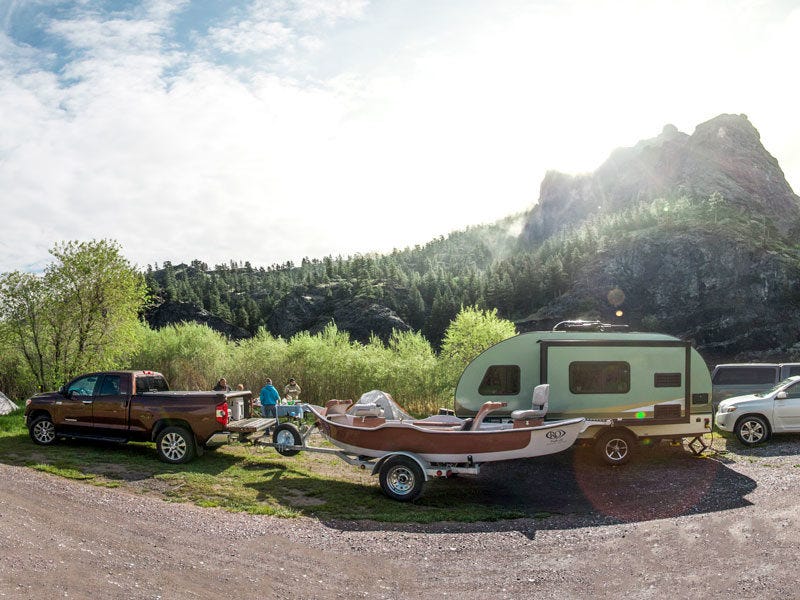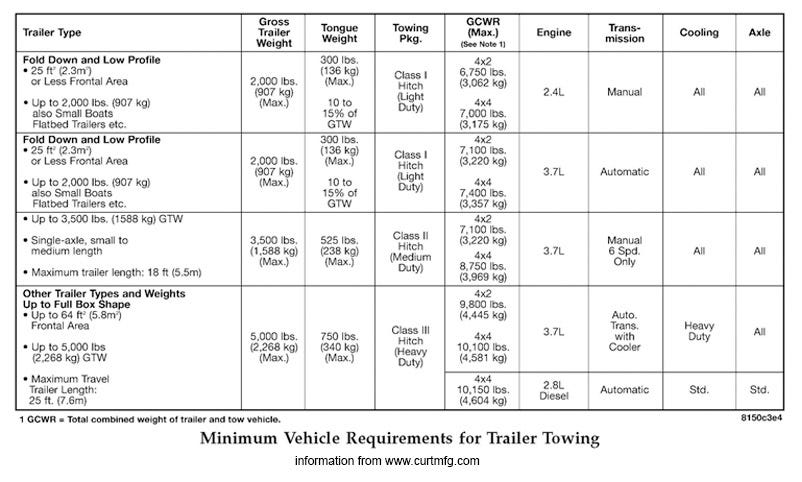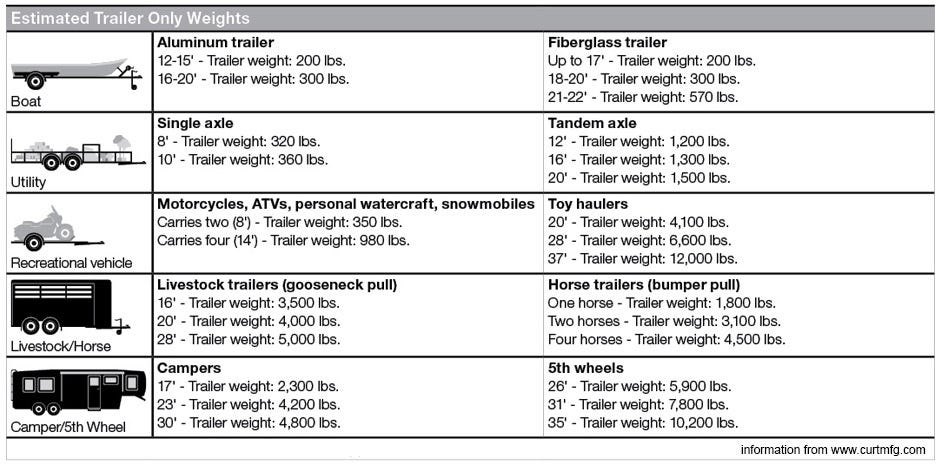How do I Determine Towing Capacity?


You have to understand your vehicle's maximum towing capacity before you tow. To exceed the manufacturer's rated capacity is to create an unsafe driving situation.
This could possibly lead to damage to your vehicle's engine, transmission, rear axle, brakes and wheel bearings. It will definitely void the manufacturer's warranty. That's why we put this blog together... so we could answer the age old question: How do I determine towing capacity?
When considering the capacity you will need, always buy high, meaning get more than you think you will actually use you don't want to be out in the middle of Neihart in winter wondering if loading an extra horse will put you over the maximum towing capacity. Buy high.
Checking Your Vehicle's Owner's Manual for your Trailer
A simple answer: read your vehicle's owner's manual and/or the information certification plate on your driver's door sill.
The owner's manual will provide detailed instructions and limitations, usually accompanied by tips for safe towing. For example, the 2000 model year owner's manual for a Ford Crown Victoria includes the following statement:
An Example of the Towing Capacity of a Vehicle as Declared by the Manual
For example the information below is from a 2009 Subaru Legacy is as follows:
- MAXIMUM TOWING CAPACITY = 2700 lbs. **
- EPA INTERIOR VOLUME = 102.3 cu.ft.
- DRAG COEFFICIENT = .31 Cd
- CURB WEIGHT = 3275 lbs.
- CARGO CAPACITY, ALL SEATS IN PLACE = 11.4 cu.ft.
**When adequately equipped, which may require engine and/or other drivetrain upgrades.
The owner's manual of the 2015 Jeep Grand Cherokee offers even more detail.
- 3.6-litre V6 engine paired with 8-speed transmission
- delivers 290 horsepower, 260 lb-ft of torque, and a 6,200 lb towing capability
Figure 4-1: Towing Capacity Chart
 If your vehicle is not capable of towing any trailer, your owner's manual will state this information explicitly. If you lost your manual, go to the dealer's online site and print one. You need to know these things to be safe on the roads.
If your vehicle is not capable of towing any trailer, your owner's manual will state this information explicitly. If you lost your manual, go to the dealer's online site and print one. You need to know these things to be safe on the roads.
Finding Your Vehicle's Towing Compliance Certification Label
After you've read your vehicle owner's manual, it's a good idea to double check the compliance certification label. This is typically a sticker placed somewhere in the driver's door sill area. This label will have several fields, labeled with acronyms such as "GVR," "GAW," and "GCWR." These fields are defined as follows:
- Gross Vehicle Weight (GVW) This is the vehicle's standard curb weight, plus an allowance for a standard amount of luggage, gas and passengers, as predicted by the manufacturer. Of course, your vehicle's actual weight will vary depending on how much luggage, gasoline, and passenger weight you have actually placed in the vehicle, so the GVW is an approximation.
- Gross Vehicle Weight Rating (GVWR) This is the maximum safe actual weight of your vehicle. If you exceed this weight, the vehicle's engine, transmission, brakes, and so on will be stressed beyond their design limits.
- Gross Combination Weight (GCW) This is the actual weight of your vehicle (GVW) plus the actual total weight (not the tongue weight) of your trailer. This number must not be higher than your vehicle's
- GCWR. Gross Combination Weight Rating (GCWR) This is the maximum safe weight of your combined vehicle and trailer. This weight includes all people, luggage, and other material. If your combined towing setup exceeds this weight, your vehicle's engine, transmission, brakes, and so on will be stressed beyond their design limits.
- Gross Axle Weight (GAW) These numbers are the weights expected to be placed on your vehicle's front and rear wheels. The two numbers are likely to be different to account for engine weight and other factors.
- Gross Axle Weight Rating (GAWR) This is the maximum safe weight that can be placed on your front or rear wheels. The two numbers are likely to be different to account for engine weight and trailer tongue weight and luggage. If you exceed this weight rating on either the front or rear tires, you can create a dangerous driving situation or even damage your vehicle.
You Need to Determine your Trailer Weight
Figure 4-2: Example Utility Trailer Weights
 After you understand your vehicle's weight capacities and general towing capacity, you need to learn your trailer's weight. Unless your trailer is home-built, it will have a VIN (Vehicle Identification Number) plate installed somewhere.
After you understand your vehicle's weight capacities and general towing capacity, you need to learn your trailer's weight. Unless your trailer is home-built, it will have a VIN (Vehicle Identification Number) plate installed somewhere.
This plate not only carries the trailer's serial number, it also lists the trailer's unloaded GVW and a maximum GVWR for the trailer and a GAWR for each axle on the trailer.
Figure 4-3 shows representative weights for camping and travel trailers, and also relates those standard trailer weights to appropriate hitch classes.
 If you don't have access to a VIN plate or other weight information for your trailer, or if it's hard to estimate the total weight you're adding to the base GVW of the trailer, the best way to find the weight is to load your trailer as you expect to use it and take it to a vehicle scale.
If you don't have access to a VIN plate or other weight information for your trailer, or if it's hard to estimate the total weight you're adding to the base GVW of the trailer, the best way to find the weight is to load your trailer as you expect to use it and take it to a vehicle scale.
Such scales are sometimes available to recreational users at state highway weigh stations, refuse transfer stations, and commercial truck stops.
The advantage of this method is that you learn the actual weight of your loaded trailer. Be sure to call ahead and confirm that you are welcome to use these scales, however.
Checking the Tongue Weight of your Vehicle
The last capacity you have to consider is your trailer's tongue weight. That's the weight on the coupler when your trailer is fully loaded and ready to go. In general, you want to try for about 10% of the total trailer weight to be carried on the tongue.
Most receivers and other hitches assume that the tongue weight will be abut 10%, and sticking to this ratio helps improve your towing experience.
You can check your trailer's tongue weight with a specialized scale, available for about $150 at trailer supply shops.
But since you probably don't need to scale your trailer's tongue weight very often, you can call and ask if your local trailer dealer has a tongue scale you can use. Chances are you'll have to take your trailer to the dealer to be weighed.
Need more hands-on help? Use the for below to reach out to us here. We'll work to get back to you within 24-hours.
